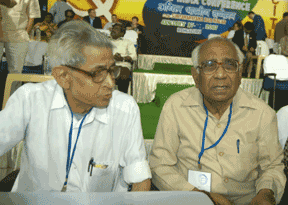 People's Democracy
People's Democracy
(Weekly
Organ of the Communist Party of India (Marxist)
No. 11
March 18, 2007
(Weekly
Organ of the Communist Party of India (Marxist)
|
Vol.
XXXI
No. 11 March 18, 2007 |
Loss Of A Dearest Colleague!

Comrade Chittabrata (left) with Pandhe at the recent all India conference of CITU held in Bangalore
M K Pandhe
IT is extremely difficult to adjust with the cruel reality in life that Comrade Chittabrata Majumdar is no more. Seventy years old life of sacrifice and loyalty to the working class came to an end on February 20, 2007. As an unassuming and lovable person, Comrade Chittabrata was not only popular among the CPI(M) and CITU cadres but also among activists of other political affiliations and central trade unions. Condolence messages received from all over India from persons and organisations belonging to all walks of life is a clear indication of this fact.
Comrade Chittabrata joined the united Communist Party during mid-fifties and his life since then was entirely devoted to the working class and trade union movement. He was a strong advocate of class struggle and considered the question of intensification of class struggle as the major objective of the revolutionary trade union movement. “Class struggle teaches the working class the real character of the capitalist society” –– this was his constant refrain. According to him class struggle is the essence of Marxist philosophy.
I remember how Comrade Chittabrata was very much active in preparing for the foundation conference of the CITU in 1970. In that conference he saw how a new organisation was being formed which would emphasise class struggle as its major form of its activity. From collection of funds to the mobilisation for the public rally he was active in making every type of preparation for the conference.
In the meetings of CITU general council and working committee, Comrade Chittabrata always emphasised the need for political actions by the trade unions. Without participating in political struggle and championing the cause of all sections of the toiling masses, the working class will not be able play a leading role in the democratic movement, he used to stress in his speeches. He was a strong critic of bureaucratism in trade union movement which according to him was a big hurdle in democratic functioning of the trade unions. I remember he used to regularly point out the necessity of trade union leaders studying the conditions of industry in depth so that they can guide the movement more effectively.
I had an occasion to meet him when he was a minister in the Left Front government in charge of small scale industry. He prepared an elaborate plan for industrial development of Bengal so that employment can be generated. In the CITU meetings he advocated modernisation of small-scale industry so that productivity can be increased to make the unit viable. Though he was a minister during Salkia Plenum of the CPI(M) on organisation, many delegates were surprised to see him working as an ordinary volunteer and looking after the needs of the delegates. He used to visit the camp daily to see whether the delegates had any difficulty. His simple lifestyle earned him great respect among his comrades.
During the eighties, both of us were part of a delegation to the Soviet Union when Gorbachev was the head of the State. We could observe the erosion in socialist values and decline in the leading role of the working class in the country’s social life. During bilateral discussions Comrade Chittabrata asked several questions which were embarrassing to the leadership of the then Soviet trade unions. When we visited a textile factory in a Moscow suburb, he pointed out that most of the women workers were employed in semi-skilled and unskilled categories while men dominated the skilled and highly skilled categories. The management admitted the fact but could not explain why it was so in a socialist country. Comrade Chittabrata collected lot of details about the living conditions of the people in Soviet Union which clearly indicated deterioration in the quality of life of the people.
In the Kolkata conference of CITU in 1991 Comrade Chittabrata Majumdar was elected as all India secretary and since then he contributed a great deal in strengthening of the all India activities of the CITU. His role in nationwide strikes organised by the sponsoring committee of trade unions was significant. He used to visit adjoining states for preparation of strike. He was a regular participant in the national conventions of sponsoring committee and always contributed in finalising the declarations of the conventions. His suggestions were always respected by other trade unions.
After becoming general secretary of CITU, Comrade Chittabrata played an increasingly important role in the united movement of the working class. His speeches in the Indian Labour Conferences as a general secretary were received well by the delegates attending the conference. His speeches were well prepared and based on collection of ground level facts.
As a general secretary he was easily accessible to everyone and he was pursuing every case referred to him by his visitors.
Comrade Chittabrata discharged three important responsibilities simultaneously viz. general secretary of CITU, Rajya Sabha member and CPI(M) Polit Bureau member. Although his health was not permitting him to attend to all these important jobs yet he was striving his best to discharge his responsibilities. As a conscious communist he was contributing meaningfully to these leading responsibilities. This aspect was appreciated by all who knew how he was facing health difficulties.
Despite his frail health nobody was expecting that he would pass away so soon. The warm message his life’s achievement has left behind him will always be cherished. As an ideal communist Comrade Chittabrata Majumdar has bestowed a legacy, which will always be remembered by CITU leadership and cadre.